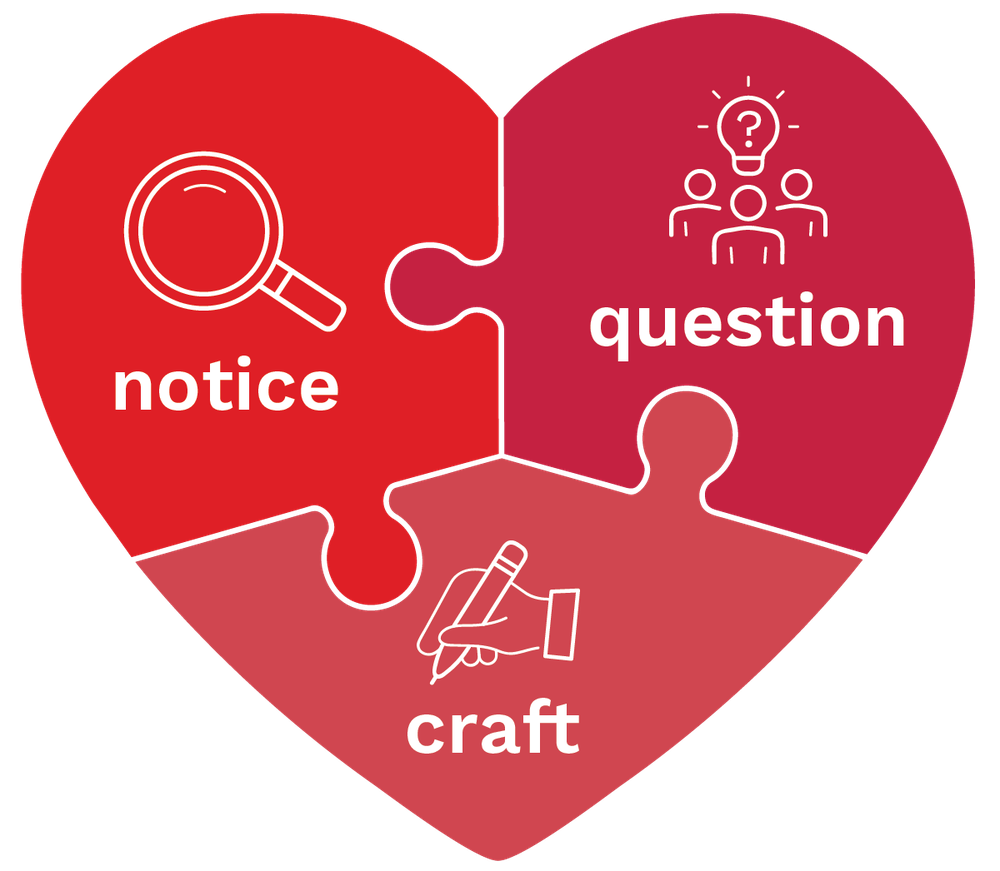Posted: January 18, 2024
A positive work community helps to create conditions where people want to work together. Sometimes, the simplest actions can help make work environments better.

Heart-shaped puzzle with three pieces; notice, question, and craft.
Notice more
Educators notice by listening, observing, and being witnesses to one another, including our words, actions, emotions, strengths, and needs. As we notice and affirm the positive efforts, strengths, and curiosities of others, we can intentionally notice the goodness in each other and our early childhood communities. We can then share our appreciation by conveying our thankfulness for the work and efforts of others.
Expand your noticing skills:
- More CAT and Gratitude (article)
- Nature Sketching Builds Strong Observation Skills (course)
Question more
Questions spark essential discoveries. Author David Brooks reminds us that using questions can assist us in connecting deeply with others by shining a light on others, or what he refers to as being illuminators. He shares that Illuminators "have a persistent curiosity about other people. They have been trained or have trained themselves in the craft of understanding others. They know how to ask the right questions at the right times—so that they can see things, at least a bit, from another’s point of view. They shine the brightness of their care on people and make them feel bigger, respected, lit up" (Brooks, 2023, para. 16).
Polish your questioning skills:
- A More Beautiful Question (article)
- Let the Magic Begin (article)
Craft more
Job crafting, not to be confused with art crafting (also important!), helps educators apply intentional efforts to find meaning in their work. Job crafting captures the active changes employees make to their own job designs in ways that can bring about numerous positive outcomes, including engagement, job satisfaction, resilience, and thriving (Berg, Wrzesniewski, & Dutton, 2008). Educators can focus on decisions that will better their work and provide meaning instead of focusing on factors out of their control. For example, Antonio wanted to avoid negative thinking while at work, so he placed positive quotes in key classroom areas as reminders to stay positive. Job crafting helps you to think about work motives, strengths, and passions and plan small changes for your work that will bring more satisfaction and joy.
Investigate
- Job Crafting (handout)
- Positive Work Environments—Where Programs and Educators Thrive! (course)
References
Berg, J. M., Wrzesniewski, A., & Dutton, J.E. (2008.) What is Job Crafting and Why Does it Matter? Center for Positive Organizational Scholarship, Michigan Ross School of Business. Retrieved January 2024.
Brooks, D. (2023, October 19). The Essential Skills for Being Human. The New York Times. Retrieved January 2024.
Humphries, J. (2018.) Commitment and Motivation: Keys to a Program’s Overall Success. McCormick Center for Early Childhood Leadership, National Louis University. Retrieved January 2024.

